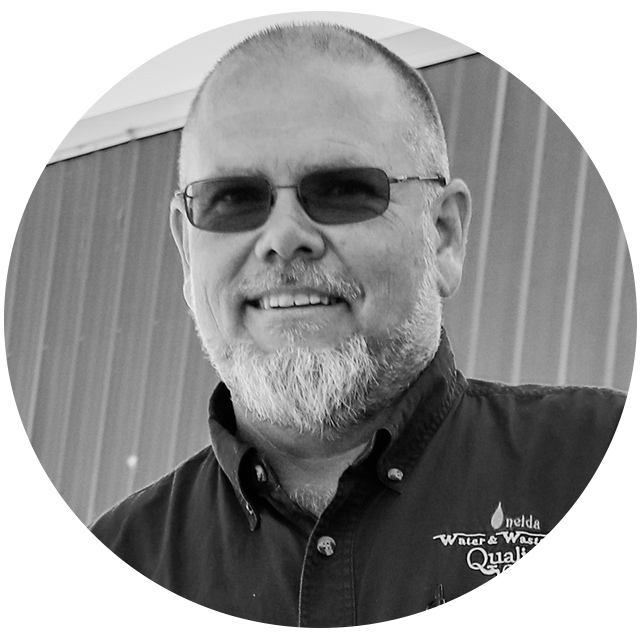Reversing water loss in a rural municipality
Three chapters on how Oneida's water department went from dealing with water loss, partnering up and overcoming the challenge, to getting unexpected results.
Oneida was experiencing 51% water loss
Losing approx. 750 million litres a year, worth approx. €183,000
Chapter 1: A municipality on alert for water leak detection
In June 2019, the town of Oneida, Tennessee, was experiencing an impossible situation. With increasing state regulations and massive water loss, the water department was taken over by the local government.
Oneida produces approx. 1500 million litres of water a year and saw a 51% water loss, meaning that over 750 million litres were being lost to leaks every year. The loss was costing the municipal council approx. €183,000 annually and meant the water treatment plant had to operate on 12- to 14-hour days to keep up with demand.
Oneida received a warning from the EPA and, like many rural municipalities with limited resources and ageing infrastructure, was overwhelmed by increasing expectations and out of ideas.


Topography challenges in Oneida, Tennessee
Many municipalities will relate to the complex set of conditions that Oneida must embrace to provide quality water on tap. It's remote, rural and breathtakingly beautiful all at once. The diverse topography contains a mixture of mountains and valleys with elevations ranging from approx. 240 metres to approx. 610 metres. The same rugged topography that makes Oneida a recreational paradise makes it an obstacle course for water distribution and maintenance.
Oneida faces a complex set of conditions to provide quality water on tap. The diverse and rugged topography creates an obstacle course for water distribution and maintenance.
The town of Oneida sits along the northern middle border of Tennessee with the closest city about 100 kilometers away in Knoxville. Oneida’s economy is also in transition; the area is a mix of working farms, manufacturing and low- to mid-income housing, with a tax base of 5,000 customers who are affected by the cost and accessibility of water.
Oneida’s water system includes two water supply reservoirs, one water and waste water treatment plant and an ageing water distribution system. Routine droughts are also impacting the water supply.
The town’s water department is run by local people. From the field technician to the plant manager to the mayor Jack Lay, the Oneida water department reflects the community. It's a mix of generations, some of whom are related - all of them public servants and water customers.
Oneida's challenges
Ageing infrastructure
Rugged topography
Routine droughts

Leak detection diary 1: Acoustic leak detection Paying water bills
During the initial three-month period after the Kamstrup meters were installed, Oneida uncovered and repaired a single leak that had been running for five months at an estimated cost of approx. €21,000 per year.

Chapter 2: Partnering up to reduce water leaks
The relationship between Kamstrup and Oneida was established with the arrival of a new General Manager, Stephen Owens, at the Oneida water department. A veteran water steward, Owens came out of retirement to help the town, working on the pre-condition that the municipal council needed to fix the leaks before it could overhaul its infrastructure.
Owens sought an AMI partner (Advanced Metering Infrastructure) with ALD experience (Acoustic Leak Detection) to help detect leaks for the municipal council. Owens started with Kamstrup, an impressive company he had encountered years earlier at a trade show.
The municipal council of Oneida became Kamstrup’s first fully ALD system in the U.S.

.png%3Fh%3D380%26iar%3D0%26w%3D320&w=750&q=100)
4,600 meters
12 collectors

Turning the lights on
Oneida installed 4,600 Kamstrup meters and erected 12 collectors in the EPA’s designated five-week timeframe. With no more than four, or .08%, meters non-operational upon arrival, this proved to be a huge success.
Once the meters were installed, Oneida shifted its focus to activating the ALD system. “It lit up like a Christmas tree,” which was a relief for the water department, as it gave them information, direction and pinpointed exact locations to start fixing leaks.
In the first three months after the Kamstrup meters were installed, Oneida’s non-revenue water was reduced by 23%. The municipal council’s 51% water loss was reduced to 38% loss, and the water treatment plant operation was reduced by three hours per day. With leak detection in tow, Oneida has transitioned to recovery and is steadily upgrading its infrastructure, utilising a two-man crew to fix an average of five to six leaks per day.
The results
Non-revenue water loss Reduced 23% in three months
Water treatment plant operation reduced by three hours a day
Oneida aims to repair approx. 3.2 km of pipe per year and reduce its water loss to under 15%

Leak detection diary 2: How fixing one leak savedapprox. €162,000
One of the advantages of the Kamstrup ALD system is the ease with which you can spot abnormalities. One particular leak that was detected in Oneida was on the residential side, with a spike in the system indicating a leak with water loss at a rate of approx. 863 lt/h. The municipal council notified the home-owner, fixed the problem and identified the source as a broken tap behind a house. It estimates this leak detection and solution saved the home-owner approx. €162.000.

Chapter 3: From fixing leaks to managing assets
The water department has become adept at using the Kamstrup ALD system. They are doing the hard work of methodically addressing leaks and repairing their infrastructure. The municipal council is aiming to repair approx. 3.2 km of pipe per year and reduce its water loss to under 15%. With leaks and loss under control, the Oneida water treatment plant continues to improve its operating time.
Oneida is now a showcase for municipal water management in Tennessee. In spring 2022, the municipal council was awarded additional grant money for infrastructure improvement thanks to its proactive efforts and transformation.
As partners in leak detection and water management, Kamstrup and Oneida actively share intelligence and insights. The project has exceeded every expectation. In the words of Oneida’s Stephen Owens: “We think the system performs even better than Kamstrup thought it would.”
.jpg%3Fmw%3D672%26mh%3D672&w=1920&q=68)








